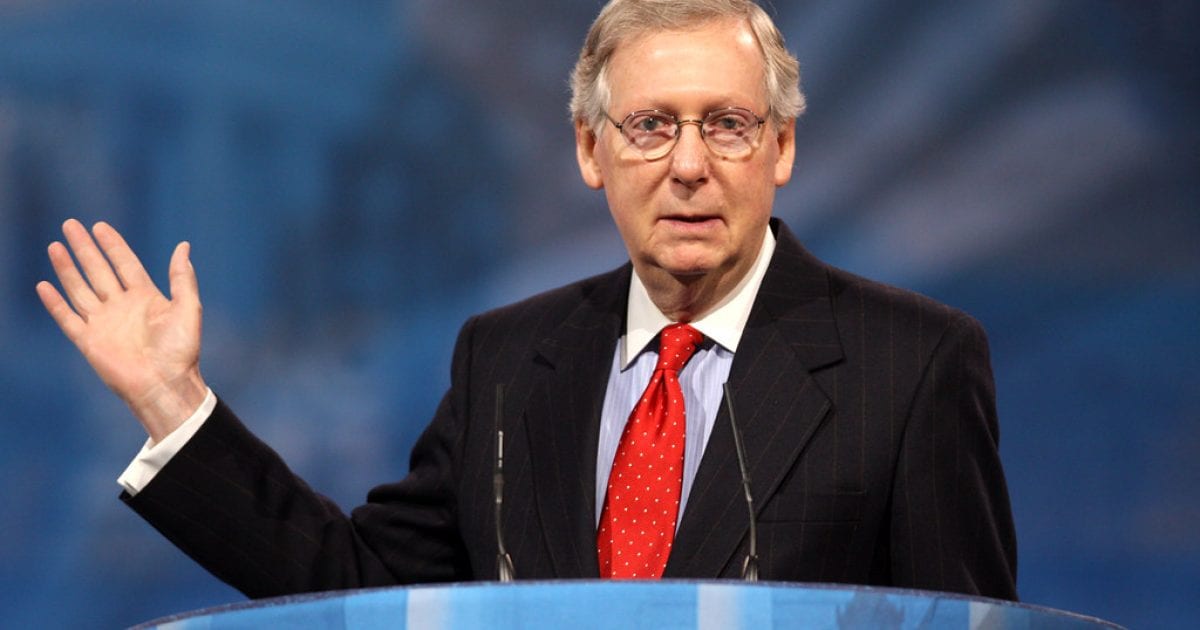Mitch McConnell has just announced that he has enough votes locked in to move forward with setting up the Senate impeachment trial rules without Democrats.
In effect, this will allow McConnell to bypass Chuck Schumer’s demands for new witnesses and hold the impeachment trial with the same rules Clinton had.
Take a look:
Here's what McConnell had to say on Twitter:
Politico has more details:
Senate Majority Leader Mitch McConnell is moving forward on a set of impeachment trial rules without Democratic support.
The Kentucky Republican said Tuesday that he has locked down sufficient backing from his 53-member caucus to pass a blueprint for the trial that leaves the question of seeking witnesses and documents until after opening arguments are made.
That framework would mirror the contours of President Bill Clinton’s trial and ignore Senate Minority Leader Chuck Schumer’s demands for witnesses and new evidence at the outset.
“We have the votes once the impeachment trial has begun to pass a resolution essentially the same — very similar — to the 100 to nothing vote in the Clinton trial,” McConnell told reporters. “All we’re doing here is saying we’re going to get started in exactly the same way that 100 senators agreed to 20 years ago.”
The GOP leader added that the Senate will "get around to the discussion of witnesses," but not before the Senate trial begins.
Schumer reiterated his pledge to force votes on witnesses and documents and offered his own warning to Senate Republicans Tuesday afternoon: "You can run but you can't hide."
"Large numbers of Republicans have refused to say whether they are for witnesses and documents and that’s why Leader McConnell came up with this kick-the-can down the road theory," Schumer said. "McConnell will never go for it but will four of his Republican colleagues?"
The Hill also said:
Senate Majority Leader Mitch McConnell (R-Ky.) has the votes to quash Senate Democratic Leader Charles Schumer’s (N.Y.) demands to require additional witnesses testify at the start of President Trump’s impeachment trial.
Two key moderate senators, Susan Collins (R-Maine) and Lisa Murkowski (R-Alaska), on Monday evening backed McConnell’s position that the Senate should follow the precedent of the 1999 Clinton impeachment trial and defer until later in the process the question of calling additional witnesses.
Collins told reporters at Monday evening votes that the Senate should follow the 1999 precedent and consider the question of subpoenaing additional witnesses and documents only after House impeachment managers and Trump’s defense team present their opening arguments.
She noted in a statement Monday that then-Senate Majority Leader Trent Lott (R-Miss.) and Democratic Leader Tom Daschle (D-S.D.) adopted a resolution in 1999 to set out the rules for the proceeding that didn't include any agreement for specific witnesses to testify.
“The process moved to a period during which the Senate debated and voted that three witnesses should be deposed. I believe that this process — the Clinton approach — worked well,” she said.
Murkowski also urged colleagues to follow the path laid out during the Clinton trial.
“I think we need to do what they did the last time they did this unfortunate process and that was to go through a first phase and then they reassessed after that,” she told reporters.
The Alaska senator also said questions about whether former national security adviser John Bolton and other key witnesses should testify should be discussed only after Speaker Nancy Pelosi (D-Calif.) sends the articles of impeachment to the Senate.
“We don’t have anything to get to? So do you have any interesting news for me on that? Like when we might be able to get articles?” she said.
She said the precedent set by Clinton’s trial “is how we get started with this.”
“I don’t think there is any decision on Bolton because we don’t have articles,” she added.
The statements of these two crucial votes are a setback for Schumer and Pelosi who have been pressing GOP moderates hard over the past several weeks to insist on an opening resolution for the trial that would set the table for subpoenaing key witnesses and documents.




Join the conversation!
Please share your thoughts about this article below. We value your opinions, and would love to see you add to the discussion!